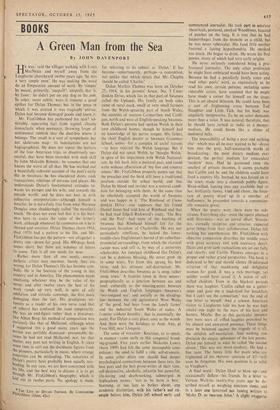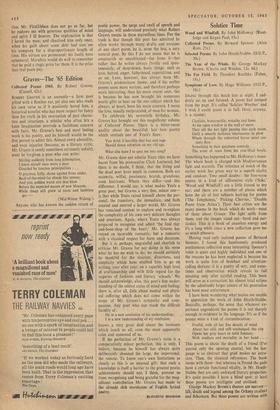BOOKS A Green Man from the Sea
By JOHN DAVENPORT
EE was,' said the villager walking with Louis MacNeice and myself away from the Laugharne churchyard twelve years ago. 'he was a very simple man.' He was making the word do an Empsonian amount of work: By 'simple' he meant, primarily, 'unspoilt'; unspoilt, that is, by fame: he didn't put on any dog in the pub. In other, more subtle, ways it remains a good epithet for-Dylan Thomas; but in the sense in which it was uttered it was tragically untrue. Dylan had become damaged goods and knew it.
Mr. FitzGibbon has performed his task* ad- mirably, separating fact from legend; cleanly iconoclastic when necessary, throwing f.-ttaps of sentimental rubbish into the dust-bin where it belongs. The result is •a sort of sympathetic but not idolatrous map: its indentations are not hagiographical. He does not repeat the horrors of the four American trips, so disastrously suc- cessful, that have been recorded with such skill by John Malcolm Brinnin: he assumes that one knows the worst .of all that. He has worked out a beautifully coherent account of the poet's early life in Swansea; he has elucidated dates, cash transactions, relations of persons and places. He understands Dylan's fundamental attitudes to- wards his parents and his wife, and towards the outside world; and he does not butt in with subjective interpretations—although himself a novelist, he is mercifully free from what Norman Douglas once shudderingly called 'the novelist's touch.' He does not even feel that it is his busi- ness here to assess the value of the writer's work, although whenever he comments on it he is shrewd and sensitive. Dylan Thomas (born 1914, died 1953) had a pattern to his life, and Mr. FitzGibbon has put the pattern—not altogether a pretty one—down for good. His 400-page book seems short, but there are volumes of letters to come. This is all one needs for now.
Rather more than all one needs, unsym- pathetic critics may murmur. Surely they are wrong, for Dylan Thomas's life has become sym- bolic. He is the laureate of the young in this country and in America. The phenomenon needs analysing, whatever may be the • value of his verse; and after twelve years the best of his work stands up very well, in spite of oily adUlation and vitriolic contempt, the first more damaging than the last. His prodigious vir- tuosity as a reader of his own verse (and that of others) has confused the issue temporarily. He was an end-figure rather than a precursor, like Alban Berg; his method of composition was curiously like that of Mallarmd, although when I suggested this a good many years ago the notion was pettishly dismissed--presumably be- cause he had not read Mallarme; nor, for that matter, any poet not writing in English. It takes some time to sort out the deciduous figures from the pioneers, particularly in music, where strange sonorities can be misleading. The sonorities of PYlan's poetry have probably been equally mis- leading. In any case, we are here concerned with his life, and the best way to discuss it is to go through Mr. FitzGibbon's biography, which is laid out in twelve parts. No apology is made s...* THE LIFE OF DYLAN THOMAS. By Constantine vItzGibbon. (Dent, 4
for referring to its subject as 'Dylan.' It has become—unfortunately, perhaps—a convention, not unlike that which. insists that Mr. Chaplin should be called 'Charlie.'
Dylan Marlais Thomas was born on October 27, 19.14, in his parents'. house, No. 5 Cwm- donkin Drive, which lies in that part of Swansea called the Uplands. His family on both sides came of rural stock, small or very small farmers from the Welsh-speaking part of South Wales, the counties of western Carmarthen and Cardi- gan, north and west of English-speaking Swansea.
Both Dylan's parents had spoken Welsh in their own childhood homes, though he himself had no knowledge of his native tongue. His father,
the chief English master at Swansea Grammar School, seems—for a complex of social reasons —to have rejected the Welsh language. But if Dylan did not speak Welsh, he 'thought Welsh,' in spite of his impatience with Welsh National- ism; he felt back into a pastoral. past, and could write without affectation of 'my five and country senses.' Mr. FitzGibbon properly points out that the preacher and the bard still have a traditional position outside the urban world, and that Dylan by blood and instinct was a natural candi- date for belonging with them. At the same time he absolutely accepted the world of Swansea and was happy in it. 'The Rimbaud of Cwm- donkin Drive'--one supposes that his friend Daniel Jones had told him of Rimbaud and that he had read Edgell Rickword's study, 'The Boy and the Poet'—had none of the loathing of Swansea that Rimbaud himself felt for the bourgeois boredom of Charleville. He was not particularly rebellious, he lacked the lower- middle-class Englishman's hatred of his suburban- provincial surroundings, from which the classical escape was, and still is, by way of a university scholarship. An indulged childhood like Dylan's can be a dubious blessing. He never grew up in some ways. Yet from this sprang his best verse, and his ultimate self-destruction. Mr. FitzGibbon describes Swansea as 'a snug, rather smug town.' A frontier town in three senses: geographically as a junction between sea and land; culturally as the meeting-point between the Welsh and English languages—Swansea's 'two-tongued sea'; and socially as the dividing- line ;between the old agricultural West Wales of 'the good, bad boys from the lonely farms' and the industrial South Wales of today. A frontier without hostility: that is, essentially, the point. For Dylan a cosy place, cosy as the womb. And there were the holidays to Aunt Ann, at Fern Hill, near Llangain.
The sense of vocation—Keatsian, so to speak, in essence—came early in this congenial breed- ing-ground. Five years earlier Malcolm Lowry (born 1909) had felt the same inescapable com- pulsion: the need to fulfil a role, self-dramatic. In some other place one should find deeper psychological connections between these two, the best poet and the best prose-writer of their time, self-destructive, alcoholic, infantile but powerful, life-loving and death-seeking, submerged in Sophoolean waves: 'not to be born is best.' Scorning, or too lazy to bother about, any academic distinction, with his father's sad ex- ample before him, Dylan left school early and commenced journalist. He took part in amateur theatricals, postured, smoked Woodbines, boasted of patches on the lung. It is true that he had hemorrhages from the bronchi as a child, but he was never tubercular. His fond little mother fostered a lasting hypochondria. He smoked too much. He began to drink. He wrote his first poems, many of which had very early origins.
He never seriously considered being a pro- fessional journalist. The only other profession he might have embraced would have been acting. Because he had a peculiarly lovely voice and read other poets' work as expressively as he read his own; certain persons, including some reputable actors, have assumed that he might have made a career for himself on the stage. This is an absurd delusion. He could have been a sort of frightening cross between Tod Slaughter and Little Tich, but his body was singularly inexpressive. To be an actor demands more than a voice. It was natural, therefore, that he should have turned to radio as a money- medium. He could boom like a chime of mediaeval bells.
The impossibility of being a poet and nothing else—which was all he ever wanted to be—drove him into the grey, half-amateurish world of broadcasting: the most dreary medium ever devised, the perfect medium for emasculate 'modern' man. Had he possessed even the smallest of private incomes, it seems probable that Caitlin and he and the children could have lived a country life. Instead, he was forced on to the town,- made into a clownish public figure. Weak-willed, lapsing into any available bed or bar, brilliantly funny, kind and clever, the foun- tain of poetry dried up in a smother of buffoonery, he proceeded towards a convention- ally romantic grave.
When the poetry went there were no sub- stitutes. Everything else--even the opera planned with Stravinsky—was an unreal effort. Stravin- sky, eternally receptive and creative, expected great things from their collaboration. Dylan felt nothing but apprehension. Mr. FitzGibbon with objective compassion describes the middle years with great accuracy and with necessary detail. 'Dates and grim Cash transactions are set out fully and clearly; and Caitlin Thomas emerges in a proper and rather grand perspective. The book is dedicated to her and should silence ill-informed criticism of that maddening and delightful woman for good. It was a rich marriage, yet neither could have saved it. A union of self- willed children. Even in the blackest periods there was laughter. 'Caitlin called me a gutter-
' snipe and gave me a toad-stool for breakfast, but I can't see the connection,' was the end of one letter to myself. And a solemn American visitor to Laugharne told me how he was kept awake one night by the tears of his host and hostess. Maybe. But in this particular instance they were tears of stifled laughter provoked by his absurd and unwanted presence. These things must be balanced against the tragedy of it all, the childish self-mutilation. And nothing can diminish ihe elegiac splendour of the late poems. Dylan put hirtiself in what he called 'the second eleven.' This was not mock-modesty. He had a fine taste. The funny little flat poets who are frightened of his rhetoric envious of it?—will soon be forgotten. His own position is as solid as AVafiuiglahl wan'so. rd: Dylan liked to blow up—and occasionally deflate—his friends. In a letter to Vernon Watkins twenty-five years ago he de- scribed myself as weighing nineteen stone, and in a later one lamented not having written to 'Moby D. or two-ton John.' A slight exaggera-
tion. Mr. FitzGibbon does not go so far, but he endows me with generous qualities of mind I loved the man; and chastised him only once, and spirit I ill deserve. The explanation is that when his guilt about some debt had cost 'me his company for a disproportionate length of time. His virtues are permanent; his faults were ephemeral. Moralists would do well to remember that he paid a ttagic price for them. It is the price that real poets pay.







































 Previous page
Previous page